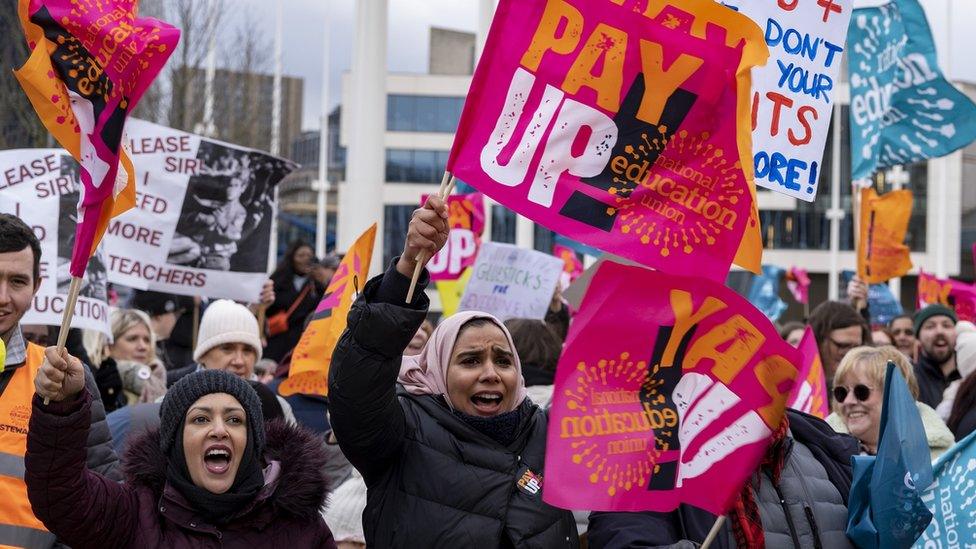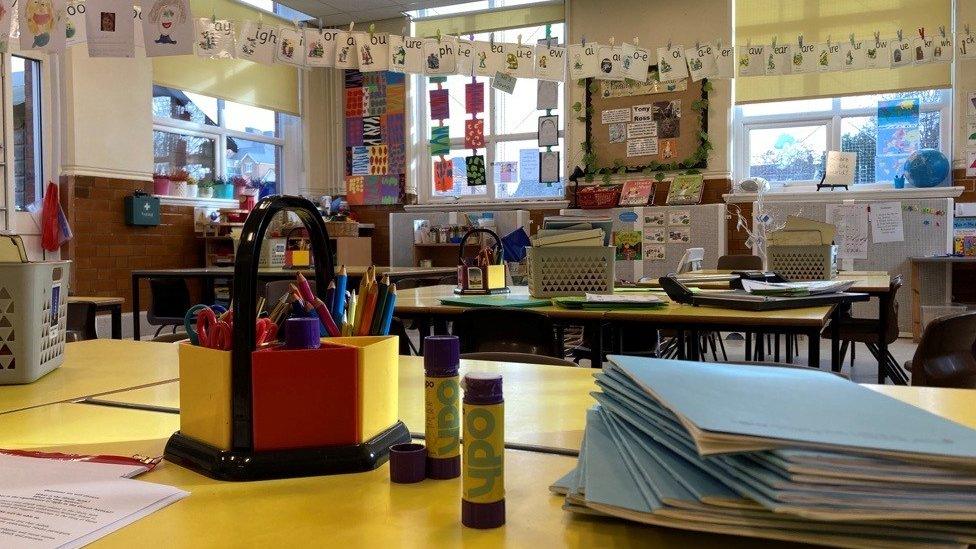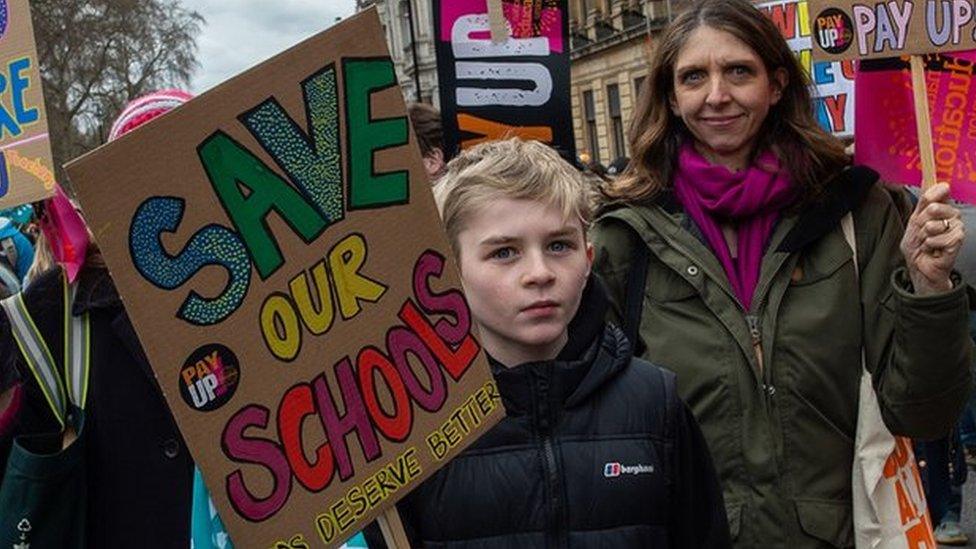Teachers' strikes: NEU urges teachers to reject new pay deal
- Published
- comments

Teachers from the National Education Union held three national strike days in February and March
Schools in England could face further strike action as the National Education Union has asked teachers to reject a new pay offer, after intensive talks.
The government has offered teachers a £1,000 extra cash payment this year and a 4.3% rise for most staff next year.
Many teachers in England received a pay rise of 5% in September 2022 but unions say this was a cut due to inflation.
Thousands of schools were disrupted by the latest walkout by teachers who are members of the NEU.
Four unions have been involved in six days of intensive talks with the education secretary since 17 March about teachers' pay, conditions and workload.
The NAHT, NEU, ASCL and NASUWT unions have been calling for above-inflation pay rises, funded by extra money from the government rather than coming from schools' existing budgets.
The government says it is giving schools £2.3bn over the next two years and starting salaries for new teachers will reach £30,000 next year.
It says this is "a fair and reasonable offer" and commits to reducing workload by five hours each week.
In an interview with the BBC, Kevin Courtney, the NEU's general secretary, said his union was unhappy with the offer and believed it was "not fully funded in schools, and that the majority of schools would have to make cuts in order to afford it".
Members will be able to vote on the offer through an electronic ballot, which will run until Sunday. The result of that will be announced at the NEU conference on 3 April.
More walkouts could be called if members reject the offer.
Mr Courtney said the "lack of teacher pay rises" was one reason schools were struggling to recruit and retain staff.
"That's impacting on children's education every day," he said.
Speaking to BBC Breakfast, Mr Courtney said the government "isn't funding schools well enough".
If accepted "60% of schools would have to make cuts to fund even this inadequate offer", he said.
He stressed that if further strikes were planned "local arrangements" would be made to ensure Year 11 and Year 13 students would be in school ahead of exams.
The NASUWT union is also recommending its members reject the government's offer. It says the government has chosen to respond only to a small number of the working-condition issues raised by unions.
The school leaders' union, the NAHT, is asking members whether they want to accept or reject the offer.
It will also ask if they would be prepared to vote for industrial action if the offer is rejected.
Results of their first ballot in January showed that the majority of members were in favour of strike action but turnout was 42%, under the legal requirement of 50%.
The ASCL is also consulting its members.

More than 50% of schools in England were fully closed or restricted attendance during strike days on 15 and 16 March, according to government data
Teacher salaries fell by an average of 11% between 2010 and 2022, after taking inflation into account, the Institute for Fiscal Studies says., external
The government had offered most teachers a 3% rise for the next school year, 2023-24.
The NEU says the new pay offer will give teachers an average increase of 4.5%, but experienced teachers will get 4.3%. The union says this is a real-terms pay cut which will leave many teachers still struggling to make ends meet.
The BBC has been told if the unions reject the offer, the decision on how much teachers will be offered will be passed to the pay review body, an independent body which gathers evidence on what some public sector workers are paid. But if this happens, the £1,000 cash payment for this year would not happen.
Outside a primary school in Manchester, Fahad, who has two primary school-aged children, says he is still supportive of the teachers' demands even if more strikes go ahead.
"These professions should be looked after and given more support and more increase in pay," he says.
Farnaz said teachers were well within their rights to strike if they wanted to, but that "it's hard when they're off because then I have to take time off work".
"I hope they come to some sort of agreement and that (teachers) do get what they want," she adds.
A Department for Education spokesperson said the government had put forward a "fair and reasonable offer, backed with funding for schools".
"The offer provides an average 4.5% pay rise for next year, puts £1,000 into the pockets of teachers as a one-off payment for this year, and commits to reducing workload by five hours each week.
"This is a good deal for teachers that acknowledges their hard work and dedication."

Fahad, who has two children in primary school, says if more strikes go ahead he is still supportive of teachers' demands
The dispute over teachers' pay has been resolved in Scotland.
Teachers in Scotland have accepted a 7% rise for 2022/23, which will be backdated to April. They have also accepted a 5% rise in April 2023, and a 2% rise in January 2024.
Teachers from the largest teaching union in Wales, the NEU, have agreed on an increased pay offer of 8% for 2022/23, which consists of a 6.5% annual pay rise and a one-off lump sum payment, as well as a 5% pay rise for 2023/24.
But Wales' school leaders' union, NAHT Cymru, has rejected the offer and says funding arrangements remain a major concern for school leaders. Members are continuing to take action short of strikes - which includes refusing to attend evening meetings and only responding to calls and emails between 09:00 and 15:00 BST.
In Northern Ireland, five unions are also continuing to take action short of a strike.
Additional reporting by Kate McGough
Related topics
- Published15 April

- Published16 March 2023
